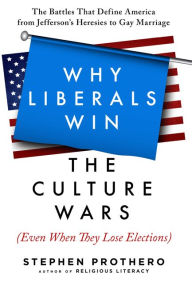Boston University Professor Prothero’s history of culture wars in the U.S. is both informative and tendentious. He defines culture war as a fight for tolerance and inclusion on the part of the left while conservatives resist this in defense of a cultural status quo that is doomed. (Near the end of the book, though, this definition is strangely abandoned.) Thus he argues the first culture war was between the Federalists and Jeffersonians and that, with Jefferson’s election and re-election, the country became more tolerant and inclusive regarding non-traditional Christians being president. The problem is that this interpretation does not always work well. In the chapter on Prohibition, for example, Mr. Prothero asserts (with little, if any, argumentation) that the fundamental issue was not alcohol but urbanization and immigration. This is questionable. In addition, he does not frame the controversy over abortion–or even raise as a possibility–as inclusion of the unborn with the left on the exclusionary side. Furthermore, the book does not deal with the major issue of gun rights which is difficult to portray as a battle for inclusion and tolerance by the left and also as a battle the left has definitively won. Regarding the controversy over Mormonism (which is covered by the book), he admits that the Mormons had to surrender on the issue of polygamy but does not acknowledge this as at least a partial victory for the right.

